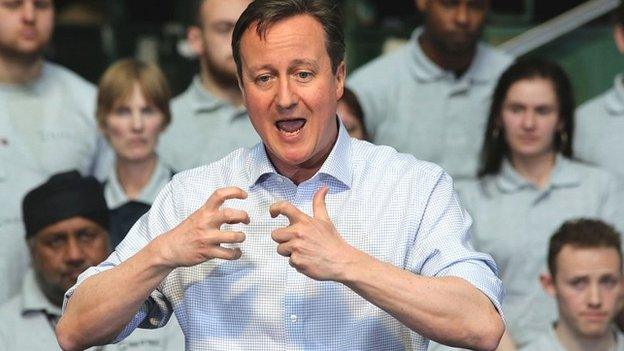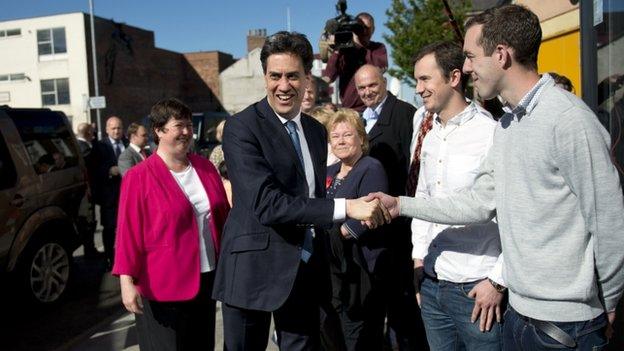Reality Check: Will a ‘No Tax Rises’ law stick?
- Published

David Cameron has pledged no increases in VAT, income tax or national insurance
Former Conservative leader William Hague says "putting finances back on track" has enabled his party to promise the introduction of a Parliamentary Act that will rule out increases in income tax, VAT and national insurance contributions.
This might be a useful statement of intent but as a former leader of the House of Commons - the man responsible for looking after legislation - Hague should (and maybe does) know that any such Act would be, legalistically, total nonsense.
Why so?
Let's say that the Tories win the election and put a No Tax Rises Act on to the Statute Book. What then, in this legislation, prevents the Chancellor of the Exchequer, whacking up tax? Absolutely nothing whatsoever.
As any first-year politics undergraduate will tell you, Parliament cannot bind or restrict itself against future measures that it may or may not enact. So if two pieces of legislation contradict each other, then the newer piece stands, and the older legislation is by de facto removed and superseded.
Parliamentary form
The budget is given effect by a Finance Act - a piece of legislation just like any other. So a government could, if it wishes, pass a No Tax Rises Act on Day One of a Parliament, and on Day Two produce a Finance Bill that does exactly the opposite.
In 2010, just months before the general election, the then Labour chancellor Alistair Darling introduced a Fiscal Responsibility Bill that put a statutory duty on the Treasury to meet specific targets for reduction of government borrowing and debt.
The Conservative Party voted against that Bill (and has repealed it since taking office). Then shadow chancellor George Osborne called the Bill "vacuous and irrelevant legislation".

What happens to ministers if the government fails to meet its targets?
He went on to ask: "Why is he the first chancellor in history to feel that he needs an Act of Parliament on top of a Budget statement?" He then proffered two potential answers: "Either he does not trust himself to secure sound public finances, or he knows that the public do not trust him to secure them. Neither is exactly a ringing endorsement."
Parliament has passed financial constraints into law before - for example, a requirement that the government meets the UN development goal of spending 0.7% on international development.
What happens if the government does not? Are charges brought? Do ministers get their wages docked or face the sack? No. The government has to write to the Commons explaining why the target has not been met. Neither this Act, nor the Labour one mentioned above, contained any effective sanction. Why should they, when in truth, they are about signalling intent? No sanctions are included because none would ever be used.
We might also wonder what sort of "from one leader to another" chats William Hague and David Cameron had about the policy? After all, Hague had a somewhat unhappy experience when he was Conservative Party leader.
In 1999, at the party conference in Blackpool, he issued a Tax Guarantee, promising that a Conservative government would not raise taxes, adding that "there will be no escape clauses, no fudging" on it. Within a year this had changed to: "We are being clear that in the event of severe recession, unexpected acts of God or war, that our commitment to health, our commitment to prudent economic management, come first."
Here's hoping for calm waters.

Election 2015 - Reality Check

What is the truth behind the politicians' claims on the campaign trail? Our experts investigate the facts, and wider stories, behind the sound bites.
Read latest updates or follow us on Twitter @BBCRealityCheck, external

- Published27 April 2015
